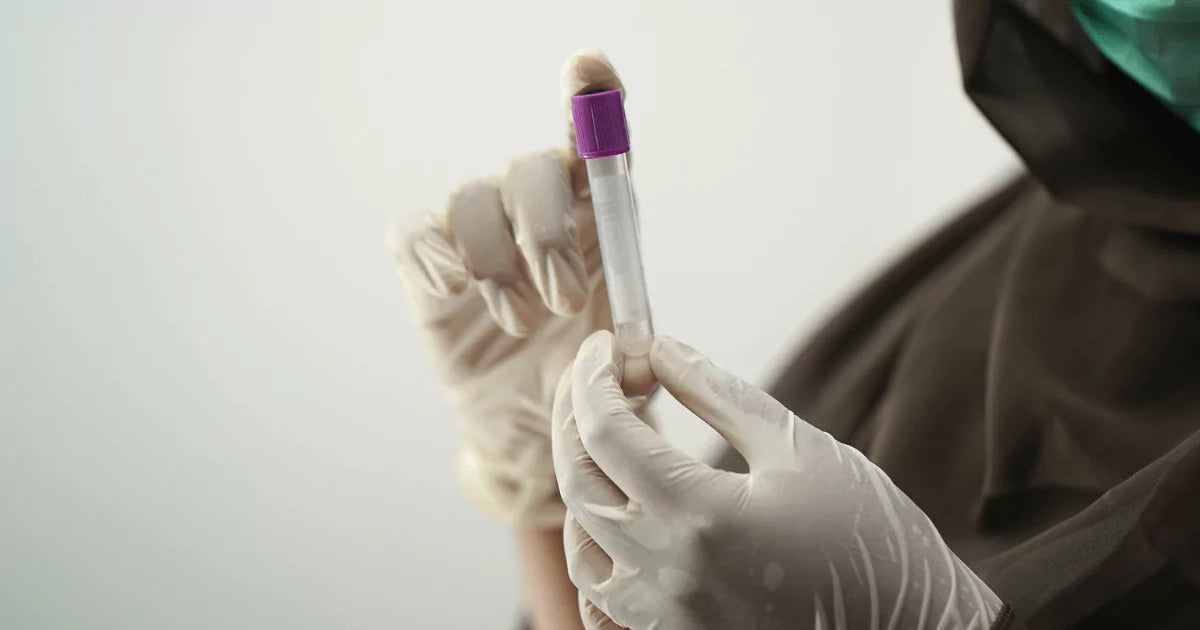Slimming with Science: Your Guide to 7 Best DNA Tests for Weight Management
If you’re struggling to lose weight, you know how frustrating and disheartening it can be. You’ve tried every diet in the book yet the numbers on the scale barely budge no matter how hard you try while others seem to effortlessly shed pounds.
You’re left wondering, “Why is this so much harder for me?” The truth is, generic weight loss plans ignore the most important factor — your unique biology and genetics.
Science now shows that many aspects related to food and weight are largely encoded in our DNA. This includes how easily we gain or lose weight, our nutrient needs, and our psychology around food preferences. Since everyone's DNA is unique, personalization of diets is key. One-size-fits-all diets do not work for everyone as they fail to consider the unique genetic factors.
Fortunately, new powerful DNA tests can uncover the biological blind spots related to food, weight, and nutrition that are unique to each person.
DNA tests play a crucial role in helping us read genetic markers, which are specific sequences within our DNA. These help to detect various traits and predispositions such as metabolism efficiency, appetite regulation, fat storage, and nutrient absorption which impact many different metabolic processes and organs, and even potential responses to certain nutrients or foods and to exercise types. Think of these markers as the instructions written in your genes, guiding the analysis of accelerators, blockers, tendencies, and sensitivities unique to you. By pinpointing these genetic-based factors, genetic testing provides a personalized roadmap so you can stop wasting time on universal tactics unlikely to work for YOUR body.
These advanced tests equip you to target the specific genetic and biological needs for sustainable weight loss - without extreme measures or denial.
Understand how DNA testing provides clarity for tailored healthy weight management. Then, take control of your health.
But first, let’s understand the correlation between DNA and weight loss.
Understanding Weight Loss: How DNA and Nutrigenomics Shape Diet Strategies
As mentioned earlier, science now shows that our ability to lose weight is greatly influenced by our DNA. Researchers are analyzing the relationship between nutrients, diet, and gene expression (a process by which information in a gene is used to create functional products, such as proteins) to develop better personalized weight loss strategies. This approach, also known as ‘nutrigenomics’ or personalized nutrition, offers more effective and lasting weight loss solutions when combined with professional dietetic guidance.

These tests can identify genetic predispositions that influence weight management, such as appetite regulation, carbohydrate and fat metabolism, and response to different types of diets. Understanding these genetic influences can help us take more informed decisions on dietary choices and weight loss goals.
1. The Science Behind It
Genetic factors play a role in weight loss among overweight and obese individuals, contributing to variations in weight. Some of the key genetic factors that can influence weight loss include:
- Appetite regulation: Genes that control hunger and satiety signals can impact how much food an individual eats and how often they feel hungry. For example, the MC4R gene is associated with increased levels of body fat. How? The MC4R gene produces a protein that sends signals to the brain to regulate food intake and energy expenditure. When the gene has a variation, the protein doesn't work quite right. This leads to increased feelings of hunger, more snacking behavior, and higher calorie intake. Over time, this can lead to weight gain.
- Carbohydrate and fat metabolism: Genes that regulate how the body processes carbohydrates and fats can affect weight gain or loss. For instance, the ADIPOQ gene is associated with lower levels of adiponectin, a protein hormone. Adiponectin is made by fat cells and helps regulate blood sugar and metabolism. People with variations in the ADIPOQ gene tend to have lower adiponectin levels. This means their bodies are less able to control blood sugar properly through insulin. Poor blood sugar control can lead to weight gain over time when the body converts more carbs to fat storage. So differences in this gene can impact how efficiently the body uses and stores energy from food.
- Response to different types of diets: Genetic variations can influence how well an individual responds to specific dietary approaches, such as low-carb or low-fat diets. For example, a study found higher genetic scores, calculated from selected SNVs, correlate with superior short- and long-term weight loss.
2. Benefits of Personalized Diet Plans
Customized diet plans are not a new concept and have been on the rise for over two decades.

They are especially useful for individuals who've hit a plateau in their weight loss journey. These plans can be tailored to optimize weight goals based on genetic insights, such as:
- Recommending specific macronutrient ratios (e.g., protein, carbohydrates, and fats) that align with an individual's genetic profile.
- Suggesting dietary modifications to address genetic predispositions, such as supporting detoxification through intake of certain foods, fiber, and lifestyle adaptations and supporting healthy gut bacteria.
- Recommending exercise routine and physical activity based on genetic profile, such as the right type of exercise routine like high-intensity interval training or endurance-type activities to burn fat.
|
Ready to end the trial-and-error weight loss struggle? Take the guesswork out and discover the custom blueprint encoded in your DNA with 3X4 Genetics at-home testing. |
3. Setting Realistic Expectations
While DNA tests can provide valuable insights into weight management and metabolism, it's essential to set realistic expectations.

These tests can identify genetic challenges in weight loss, but cannot guarantee success. Factors such as lifestyle, environment, and personal habits also play a significant role in weight management. A holistic approach, considering both genetic and lifestyle factors, is key to effective weight loss.
Top 7 DNA Test Categories for Weight Management
Here’s a look at the various DNA tests categories that should help you answer what DNA test is the best for weight loss for you!
1. Genetic Markers Analysis
In this process, scientists delve into particular genetic markers linked to how our bodies handle metabolism, regulate appetite, and store fat. What they're searching for are differences or variations in these genes that could impact how each person uniquely responds to specific diets or exercise routines. Essentially, it's like uncovering the personalized genetic blueprint that can shed light on an individual's reactions to different lifestyle choices.
2. Nutrigenomics
Nutrigenomics is a field that explores how an individual's genetic makeup interacts with their diet. Through DNA tests, scientists examine how specific genes pull the strings on nutrient metabolism, absorption, and utilization. This information is then used to provide personalized dietary recommendations.
3. Metabolism Genes Profiling
Metabolism Genes Profiling zeroes in on the genes that regulate our metabolism. By analyzing these genes, researchers can uncover variations that influence how efficiently our bodies process and burn calories. This information isn't just interesting—it's practical. It can be used to craft personalized diet and exercise plans that work best for each person's genetic makeup.
4. Appetite and Eating Behavior Gene Analysis
Some tests focus on genes associated with appetite control and eating behavior. By understanding genetic predispositions, individuals may receive recommendations on portion control and managing cravings. For example, the 3X4 Genetic Blueprint offers valuable insights into these aspects, helping individuals understand and manage their eating habits more effectively based on their unique genetic makeup
5. Exercise Response Gene Analysis
This type of test looks at genes associated with physical performance and how the body responds to different types of exercise. Its goal is to offer personalized insights into the most effective types of exercise based on an individual's genetic profile. In essence, it's like having a tailored fitness plan designed specifically for you.
6. Insulin Sensitivity and Blood Sugar Gene Analysis
Our genes hold clues about how our bodies regulate insulin and regulate blood sugar. Insulin Sensitivity and Blood Sugar Gene Analysis use genetic testing to explore variations in genes related to these crucial aspects. The result? A customized approach to dietary recommendations that supports effective blood sugar control.
7. Inflammation Genes Analysis
Chronic inflammation is a known link to obesity and various health issues. Certain DNA tests claim to dissect genes associated with inflammation, providing valuable insights into potential dietary and lifestyle modifications.
|
Stalled in your weight loss journey? Break Through Weight Loss Plateaus by Harnessing Your DNA with 3X4 Genetics! |
How to Choose the Right DNA Test
When choosing a DNA test for weight loss, consider the following factors:

- Trustworthiness: Research the company's reputation. Have people achieved positive outcomes using its DNA test findings?
- Relevance: Check if the firm offers tests specifically designed to address weight loss concerns, keeping in mind that weight fluctuations may be caused by cellular or system imbalances.
- Report clarity: Ensure that your DNA results are coherent and easy to comprehend. Do they make sense to you?
- Actionability: Consider whether the test provides clear, actionable recommendations based on your genetic profile.
- Budget: Determine your budget for the DNA test and compare the prices of different options.
- Health goals: Consider your specific health goals and choose a test that aligns with your needs.
Always consult a healthcare professional when interpreting your DNA test results. They can help you understand the implications of your genetic makeup and provide personalized recommendations.
|
Ready to select the right DNA test to meet your weight loss goals? Learn more about 3X4 Genetics’ weight management solutions and order your at-home test kit today! |
Final Thoughts
The future of weight loss will be powered by personalization through nutrigenomic testing. Instead of ineffective trial-and-error dieting, at-home DNA tests like the ones provided by 3X4 Genetics' can analyze key genetic markers related to your metabolism, hunger signals, nutrition needs, and fitness training potential.
These tests are simple, non-invasive and require you to collect a saliva sample and mail it in -- no blood draws or clinic visits needed! In just a few weeks, you’ll receive a comprehensive report analyzing your genetic markers to illuminate the biological factors unique to you that influence weight management.
Armed with this deep personalized analysis of your DNA, you can work with a dietitian or nutritionist to create a targeted weight loss plan perfect for your body’s needs. No more wasting time, money and frustration on diets unfit for your genetic profile. Take control and unlock your weight loss potential with 3X4 Genetics revolutionary at-home DNA testing. Discover the custom blueprint coded in your DNA for shedding pounds effectively and sustainably.
FAQs related to Best DNA test for weight loss
What types of genes do DNA weight loss tests analyze?
They typically analyze genes related to nutrition, exercise, sleep, stress response, and other lifestyle factors that impact weight loss. Some also examine genetic predispositions for obesity risk.
Can a DNA test guarantee I will lose weight?
No, genes are not your destiny. DNA insights provide guidance but you still need commitment to diet, exercise, and lifestyle changes that work for your body. The tests empower personalized weight loss plans.
Can DNA testing help create an effective exercise routine for me?
Yes, the tests can detect genetic differences that impact cardiovascular fitness, strength building capability, injury risk, recovery, and other factors to recommend optimal types, durations, and intensities of exercise.
Are DNA tests a one-time solution, or do they offer continuous support in weight management?
DNA tests provide a foundation for long-term weight management by offering insights into sustainable lifestyle changes, ensuring continuous support in achieving and maintaining weight loss goals. Remember that you do not have to repeat a DNA test as your genes do not change. This makes it a great lifetime health investment.


